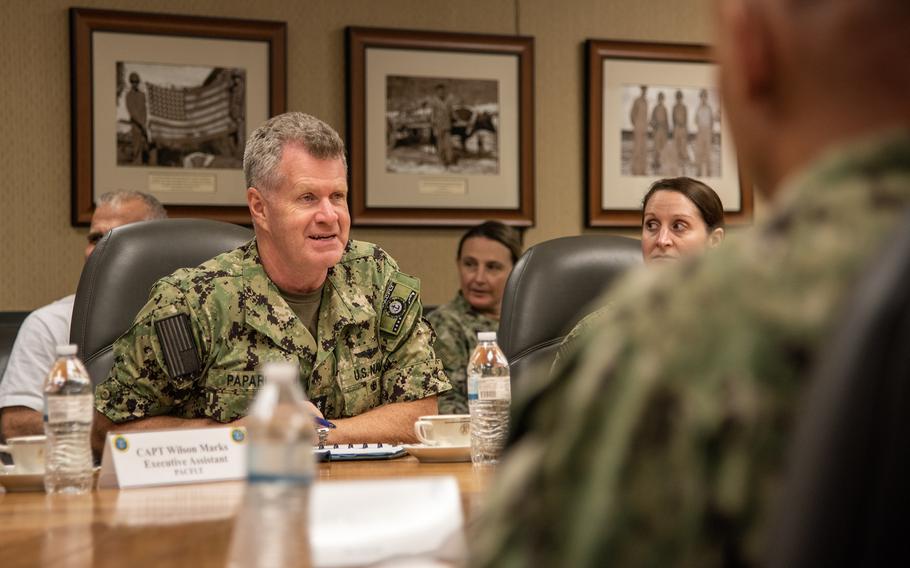
Adm. Samuel Paparo, commander of U.S. Pacific Fleet, meets with local military leaders on Guam in December 2022. Paparo testified Thursday, Feb. 1, 2024, before the Senate Armed Services Committee about his nomination to lead U.S. Indo-Pacific Command. (Shaina O’Neal/U.S. Navy)
WASHINGTON — The nominee to command American forces in the Indo-Pacific region told senators on Thursday that he is worried about China’s rapid ship and military buildup, describing its momentum as “concerning.”
Adm. Samuel Paparo, who now commands the U.S. Pacific Fleet, said the U.S. remains equipped to handle the rising dominance of China and its larger Navy fleet but the pace of the country’s warship-building raises alarm.
The Defense Department considers China a “pacing threat” that has the capability to challenge America’s military and spark a war over Taiwan, a democratically governed island and U.S. partner that China considers its own territory.
“The [People’s Liberation Army] Navy has been on a historic trajectory these last 25 years and while … I am confident that we would prevail in combat, it is a concerning trajectory,” Paparo said. “We are not overmatched but I don’t like the pace of the trajectory.”
He offered his assessment to the Senate Armed Services Committee during a confirmation hearing on his promotion to commander of U.S. Indo-Pacific Command, an area of responsibility that includes nearly 400,000 service members and half of the world’s surface.
Sen. Dan Sullivan, R-Alaska, said China’s fleet stands at about 370 ships, nearly 80 more than the U.S. Navy’s 291 ships. China added 30 ships in the last year, including an aircraft carrier and about a dozen cruisers and destroyers, he said.
The U.S. during the same time added two ships to its fleet and is set to shrink in the coming years as retirement of its inventory outpaces new construction.
“If deterrence fails and we go to war in the near term with China, we have to fight with the fleet we have today,” Sullivan said.
Paparo said he had faith the fleet would overcome any size disadvantages, pointing to American forces on land that would be used to augment its forces at sea.
“We’re a joint force that thinks in a multi-domain mindset,” he said.
However, Paparo expressed concern about the small U.S. merchant fleet, which is also dwarfed by China’s prolific shipbuilding. Only about 100 oceangoing merchant vessels fly under the American flag compared to 5,500 ships under Chinese control.
“I believe that the current size and scope of the U.S. merchant fleet is a vulnerability,” Paparo said. “It is a limitation for how forward we can put combat capability and sustain combat capability that was in maritime terrain.”
Sen. Mark Kelly, D-Ariz., said an insufficient commercial maritime capacity not only impacts trade and supply chains during peacetime but will hinder U.S. ability to supply troops in a conflict.
“This isn’t a capability that we can just turn on overnight with a switch,” he said. “We need investments now to be ready for tomorrow.”
If confirmed, Paparo said he would work with U.S. Transportation Command to identify shortfalls.
His nomination is expected to easily earn the support of the Senate panel. Sen. Roger Wicker of Mississippi, the top Republican on the committee, said he was confident Paparo is “exceptionally qualified to lead our forces in the Pacific.”
Paparo would succeed Adm. John Aquilino when he retires in the spring.
In a 37-year military career, Paparo has served as a sailor, naval officer and a fighter pilot. He has commanded the U.S. Pacific Fleet since 2021 and previously served as the operations chief for U.S. Central Command, which controls U.S. military operations in the Middle East.
Paparo’s experience also includes stints flying F-15 and F/A-18 fighter jets and leading a provincial reconstruction team in Afghanistan. He has served in 15 duty stations around the world.
He said Thursday that the Indo-Pacific region is of particular importance to U.S. military efforts because it is home to 60% of the world’s population, 60% of the world’s economy and seven of the 10 largest militaries in the world.
China, the region’s preeminent power, is extending its influence and increasingly poses an existential threat to Taiwan.
“We’re in a global environment that is increasingly disordered, increasingly chaotic. The logic of rules has been replaced with a logic of power,” Paparo said. “We must, as a nation, counter that logic with comprehensive national power across all levers of statecraft.”